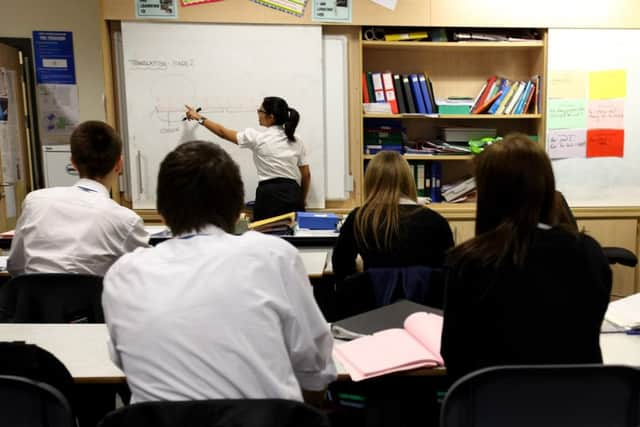Scottish council looks to shorten school week, close two schools
Clackmannanshire Council is considering reducing the hours children are taught in secondary school in an attempt to save £29 million.
Under the proposals, the school week would be cut from 27.5 to 25 hours in 2020.


Advertisement
Hide AdAdvertisement
Hide AdA council spokeswoman said: “If agreed, these changes would start in August 2020 and would not impact on pupils going into the senior phase who have chosen or are choosing subjects for next session.
“This would also allow time for the Education Service to consult with parents, young people and staff about how this proposal could be implemented.”
Another option being considered by Scotland’s smallest local authority is closing two primary schools in Clackmannanshire villages.
The at-risk schools are Fishcross and Coalsnaughton primaries, which teach a total of 143 pupils.
Parents were told by letter about the proposals earlier this week.
“If these options, which are part of a school estates review are agreed, they will then move to a statutory consultation process before any final decisions are taken,” the council spokeswoman added.
Commenting on the council officers recommending school closures, Clackmannanshire and Dunblane MSP Keith Brown MSP said: “I am concerned at reports that council officers have included options for consideration by Clackmannanshire Council in its budget-setting process which would close primary schools in Coalsnaughton and Fishcross, and have written to the chief executive seeking further information on these proposals and will be seeking the views of parents in order to ensure these are taken into account.
“Scotland’s public spending is severely constrained as a direct result of the savage austerity measures being pursued by the Tory UK Government - with Scotland’s resource block grant remaining almost £2 billion lower in real terms in 2019/20 than it was in 2010/11.
Advertisement
Hide AdAdvertisement
Hide Ad“Nonetheless, every effort must be made to protect vital public services like local schools from bearing the brunt of the relentless Tory cuts agenda.
“I will be seeking assurances from Clackmannanshire Council’s SNP administration and the opposition Labour and Tory groups, that they intend to reject these officer proposals in order that parents can be reassured over the future of these schools.”
Labour councillor for Clackmannanshire North Dave Clark pledged to fight any plans for school closures. He argued the SNP Government was to blame for the difficult position the council was in.
Cllr Clark said: “The family silver is sold, the grass uncut, the potholes unfilled and now our children are paying the price.
“I say to the people of Clackmannanshire: these are the Keith Brown cuts, their source is Holyrood, so don’t be too hard on the ‘patsies’ locally who have to implement them.”
Last year the council was told its finances were not sustainable by a public spending watchdog.
In 2018, the local authority was told its spending was unsustainable by the Accounts Commission.
It said they were “seriously concerned” with the council’s financial position with it needing to make savings of £29m over three years. Its annual budget is £118m.
Advertisement
Hide AdAdvertisement
Hide AdThe council forecast funding gaps of £13.1m in 2018/19, £7.9m in 2019/20 and £7.7m in 2020/21.
Chief executive of the council Nikki Bridle said: “These proposals from council officers are very challenging and reflect that it is now very difficult to find savings which will not impact on individuals and communities.
“Some proposals would result in reductions in service from existing levels, or change the way in which services are delivered in order to reduce costs, many of which involve working in collaboration with a range of partners.
“I would encourage residents to read over these savings options and fill in the online survey so that this can be shared with councillors before they agree a budget. Your views are a very important part of the decision making process.”
